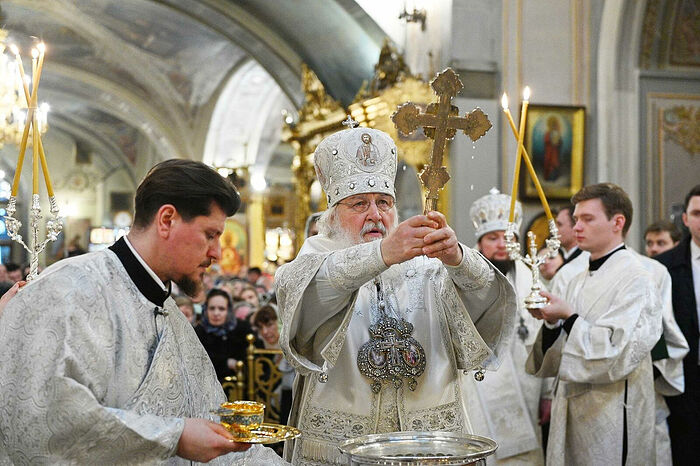A TRIUMPH OF GOD’S MERCY
A Homily on the Feast of Theophany
The following homily was delivered on the feast of Theophany in 2020 following the Divine Liturgy and the Blessing of the Waters at the Epiphany Cathedral in Moscow.
 Photo: patriarchia.ru
Photo: patriarchia.ru
In the name of the Father, and of the Son, and of the Holy Spirit!
Today is a great day—we are celebrating Theophany. We also call this day [in Russian] Baptism, because the feast was established in honor of the Baptism of our Lord and Savior in the waters of the Jordan by the hand of St. John.
It was on this day that the Holy Trinity was manifest to the world: The Son of God being baptized, the Spirit of God descending, and the Father pronouncing the great Divine mystery: This is My beloved Son, in Whom I am well pleased.
The Holy Spirit descended upon the Savior in a wondrous manner, although He was not in need of it. Reflecting upon this, St. John Chrysostom asks that if the Savior did not need the Spirit to descend, then what did the Spirit descend upon? The Spirit descended upon the visible, material world—the same world that, from the moment of the Fall, was full of hatred, strife, enmity, wars, and all kinds of impurity. This world was in need of sanctification, and not just people with their darkened minds and soul—but nature itself was caught up in and oppressed by the vortex of ever-expanding sin.
Therefore, on the day of Theophany, the Spirit descends not only upon the Son of God and the Son of Man, not just upon the human nature of Jesus Christ, but upon the waters of the Jordan, meaning upon all of creation, upon all of God’s world. And this occurred before the atonement, as a prefiguration of the great liberation of both mankind and the entire universe from the pull of sin.
We well know that, despite the mercy of God revealed to all of creation and to mankind, sin has not disappeared from our lives, but continues to exist. Sin, according to St. John Chrysostom, triumphs over mankind, but not forever. It cannot be the ultimate victor, because sin is defeated by the Savior. It is thanks to the death and Resurrection of our Lord and Savior that the great grace of the Holy Spirit is granted, so that, relying on this Divine power, every man, the whole of mankind, might be able to transfigure both itself and the surrounding world.
But it is very important that the transfiguration brought about by man, for example, regarding nature and the world around him, be brought about not in the name of sinful egoism, not in order to possess more and more tangible goods, not in order to relax and satisfy his needs, but rather that, in harmony with man, the world might manifest the Divine plan that was manifested in the act of creation, but was then damaged by human sin.
The day of the Baptism of the Lord testifies to the fact that the world has been recreated by the grace of God. The power of the grace of God is a power able to take a sinful man and recreate him as a man sanctified by Divine grace; to recreate the ravaged and darkened world as a world in its original beauty. But none of this happens automatically—it happens with the participation of man. And we must remember that every one of us must respond to this Divine grace sent down upon the whole of mankind and upon the whole of creation with faith, participation in good works, and prayer.
There can be no real improvement of the world without it. None of the well-known projects for improving human society by reform or revolution attain their goal, because they do not ensure human happiness. Human happiness is impossible without the presence of Divine grace.
This is why today is a day of the triumph of God’s mercy. The granting of the grace of the Holy Spirit for all of human nature is very important for all our worldviews. The feast of Theophany calls us to participate in God’s work of transfiguring the world, which begins with the transfiguration of our bodies and souls. This is the great responsibility on all those who have entered into the Church through the baptismal font, who are children of God, to whom is first extended the Divine call to cooperate with the grace of the Holy Spirit, with the transfiguration of ourselves and the world around us. We are called to all of this.
To some, these words may seem too abstract and far from life, but everyone who has experienced the effect of God’s grace, liberation from sin, the joy of communing of the Holy Mysteries of Christ, the joy of the renewal of the body and soul, knows what we are talking about. All of this is possible, if only we desire it, and if in response to the Divine call, we, relying on our faith, walk the great path of sanctifying ourselves and the world around us by the power of the grace of God.
Amen.


No hay comentarios:
Publicar un comentario